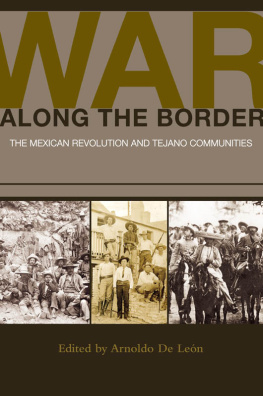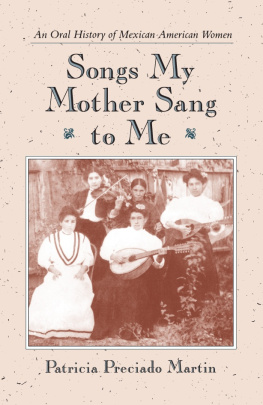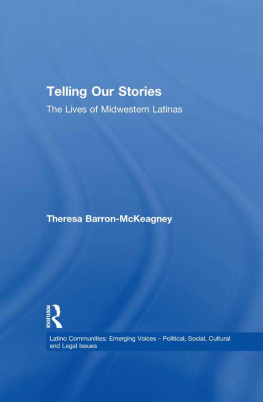Telling Border Life Stories
NUMBER EIGHTEEN
Rio Grande/Ro Bravo: Borderlands Culture and Traditions
Norma E. Cant, General Editor
A list of titles in this series is available at the end of the book.

Copyright 2013 by Donna M. Kabalen de Bichara
Manufactured in the United States of America
All rights reserved
First edition
This paper meets the requirements of ANSI/NISO Z39.48-1992 (Permanence of Paper).
Binding materials have been chosen for durability.

LIBRARY OF CONGRESS CATALOGING-IN-PUBLICATION DATA
Kabalen de Bichara, Donna M.
Telling border life stories : four Mexican American women writers / Donna M. Kabalen de Bichara. 1st ed.
p. cm. (Rio Grande/Ro Bravo: borderlands culture and traditions ; no. 18)
Includes bibliographical references and index.
ISBN-13: 978-1-60344-804-8 (cloth : alk. paper)
ISBN-10: 1-60344-804-7 (cloth : alk. paper)
ISBN-13: 978-1-60344-950-2 (e-book)
ISBN-10: 1-60344-950-7 (e-book)
1. American prose literatureWomen authorsHistory and criticism. 2. AutobiographyWomen authorsHistory and criticism. 3. American fictionMexican American authorsHistory and criticism. 4. Biographical fiction, AmericanSouthwest, NewHistory and criticism. 5. Mireles, Jovita Gonzlez, 19041983. Dew on the thorn. 6. Jaramillo, Cleofas M. Romance of a little village girl. 7. Wilbur-Cruce, Eva Antonia. Beautiful, cruel country. 8. Ponce, Mary Helen. Hoyt Street. 9. Mexican American women authorsSouthwest, NewBiographyHistory and criticism. 10. Mexican American women in literature. 11. Self in literature. 12. Group identity in literature. I. Title. II. Series: Rio Grande/Ro Bravo ; no. 18.
PS366.A88K33 2013
818.54030992870896872dc23
2012031602
Contents
Acknowledgments
Through my participation as a member of the advisory board of Recovering the U.S. Hispanic Literary Heritage Project I have come into contact with texts that have been lost and recovered. The Recovery Project has focused on the preservation and dissemination of texts from the colonial period until 1960, and three of the narratives that form part of the present study are recovered texts: Jovita Gonzlezs Early Life and Education and Dew on the Thorn, and Cleofas Jaramillos Romance of a Little Village Girl. Upon reading the life stories these women had to tell about their memories concerned with Texas and New Mexico, I began looking at other spaces, those of Arizona and California, in an effort to find additional narratives created by Mexican American women who write about life experiences prior to 1960. After I began reading the texts written by Eva Antonia Wilbur-Cruce and Mary Helen Ponce, I found that these four women had much to say to those of us who live between two or more worlds.
Closer to my personal experience, although I am not Mexican American, I do come from a multilingual family in Cleveland, Ohio, where my paternal grandfather spoke to my father in Arabic and my maternal grandmother always spoke in Slovak to my mother and her siblings. Little did I dream that I would leave the United States after marrying a man who is from Mexico. My husband and I live in the sprawling metropolis of Monterrey, Mexico, where we have raised our three children who are dual nationals. In essence, for forty years I have lived, as have my husband and children, on the border of two worlds. Therefore, I do share that experience with the four Mexican American women authors that I have chosen to study here. My husband Roberto and my childrenMonica, Roberto, and Denisehave to a great degree taken part in this endeavor. I have shared my thoughts with them, and they have generously given me time to work on what I believe is an essential projectthe recovery of memory and womens voices in literature. What better place to find these voices than in autobiographies that emanate from the margins, from border spaces.
Throughout the course of this project I have had the support of a number of areas at the Tecnolgico de Monterrey in Monterrey, Mexico. Therefore, I extend my sincerest gratitude to the Center for Studies of Memory, Literature, and Discourse, the Department of Humanities Studies, and the School of Business, Social Science, and Humanities for their intellectual and material support. My colleagues in the Department of Humanities Studies: Alicia Vernica Snchez, for meeting with me every week, for your continuous encouragement given with a smile and sense of peace; Blanca Lpez de Mariscal, for your generous spirit and example; Judith Farr Vidal, Mara Eugenia Ramos, Beatriz Mariscal Hay, Claudia Reyes Trigos, and Ins Senz Negrete, for your willingness always to share knowledge and experience; Robertha Leal and Hector Villarreal, for your technical expertise; Carolina Garza Amparn, my undergraduate assistantthis would not have been possible without your help in reviewing the technical aspects of drafts for each chapter of this book.
Portions of have appeared as The Border Autobiographies of Cleofas Jaramillo and Frances Esquibel Tywoniak: Cultural Memory as a Dynamic Process, in Interpreting the New Milenio (Cambridge Scholars Publishing, 2008); and as Eva Antonia Wilbur-Cruce (19041998), in The Greenwood Encyclopedia of Latino Literature, Vol. 2, ed. Nicols Kanellos (Greenwood Press, 2008).
Telling Border Life Stories
Introduction
Contemporary Mexican American autobiography began to be recognized as a distinct genre with the publication in 1988 of a special issue of the Americas Review.
In a more recent discussion of contemporary trends in the development of Mexican American autobiography, Charles Tatum has presented a list of twenty-six works that he says have contributed to Chicana/o canon building. In his lecture Voces nicas: Trends in Contemporary Chicana/o Autobiography, delivered in 2006 at the International Conference on Chicano Literature, he mentions the works of Acosta, Galarza, Rodrguez, and Soto. Of this list of works, which is not an exhaustive one, Tatum points to autobiographies written by the following women: Gloria Anzalda, Norma Cant, Gloria Lpez-Stafford, Pat Mora, Cherre Moraga, Sheila Ortiz Taylor, Sandra Ortiz Taylor, and Mary Helen Ponce. In addition to this list he also includes This Bridge Called My Back: Writings by Radical Women of Color, an anthology that includes life writing by women of color.
It is important to note that a number of scholars have undertaken the study of autobiographies, work that entails the life narrations and writing of Mexican Americans who express their experiences during the Padillas text includes a detailed discussion of the women whose testimonials were recorded by the Bancroft field team, and he also presents analysis regarding the importance of Romance of a Little Village Girl by New Mexican author Cleofas Jaramillo. Here he emphasizes Jaramillos desire to inscribe her own experience (197) through her life story. It is through the discursive response evident in these narratives, then, that alternative histories become evident; thus Mexican American autobiography can be seen as situated outside the formal boundaries scholars have traditionally reserved for autobiography as a singularly self-disclosing text (29).
Besides these early California memoirs, those autobiographies involving the lives of women prior to the Chicano movement are of special importance. The autobiography of Olga Beatrice Torres, Memorias de mi viaje, written in 1913, presents an account of the authors family members as they flee the Mexican Revolution and later settle in El Paso, Texas. Another recovered autobiography,
Next page





